Organisational Behaviour Analysis: Waitrose Limited Report
VerifiedAdded on 2023/01/19
|19
|5625
|73
Report
AI Summary
This report delves into the organisational behaviour of Waitrose Limited, a major British supermarket chain. It explores the influence of organisational culture, politics, and power on employee behaviour, examining how these factors shape individual and team performance. The report analyzes different types of organisational culture, including power, task, person, and role cultures, and their impact on employees. It also discusses the role of organisational politics and power dynamics, such as coercive and reward power, in shaping employee motivation and behaviour. Furthermore, the report investigates motivation theories, specifically content theories like Maslow's Hierarchy of Needs, and their application within Waitrose. The analysis extends to effective versus ineffective teams and the evolution of teams and groups. Finally, the report critically analyzes the relevance of these theories and concepts for developing a high-performing team within the organisation, offering insights into how Waitrose can optimize its organisational behaviour practices to enhance employee engagement and achieve its business objectives.
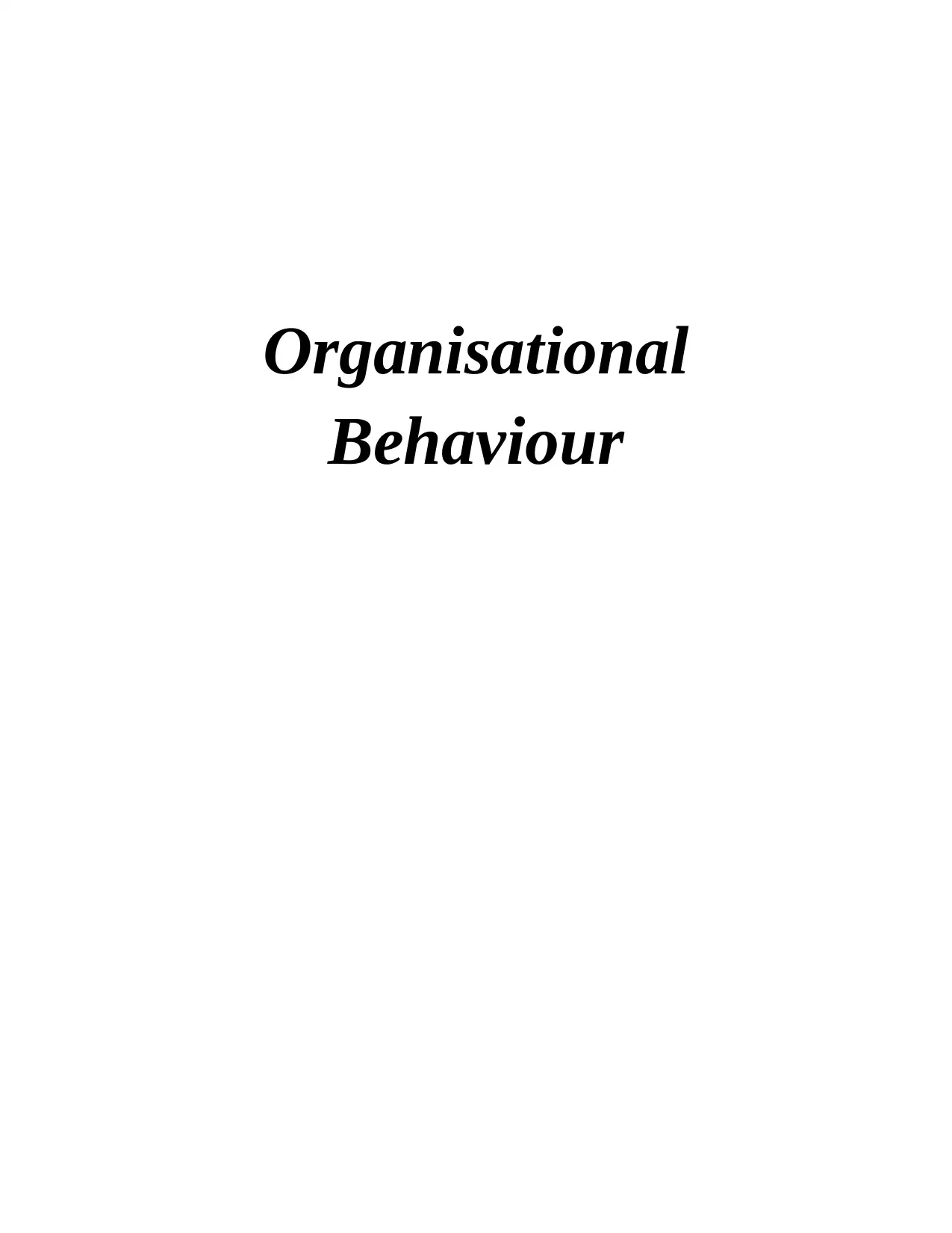
Organisational
Behaviour
Behaviour
Paraphrase This Document
Need a fresh take? Get an instant paraphrase of this document with our AI Paraphraser
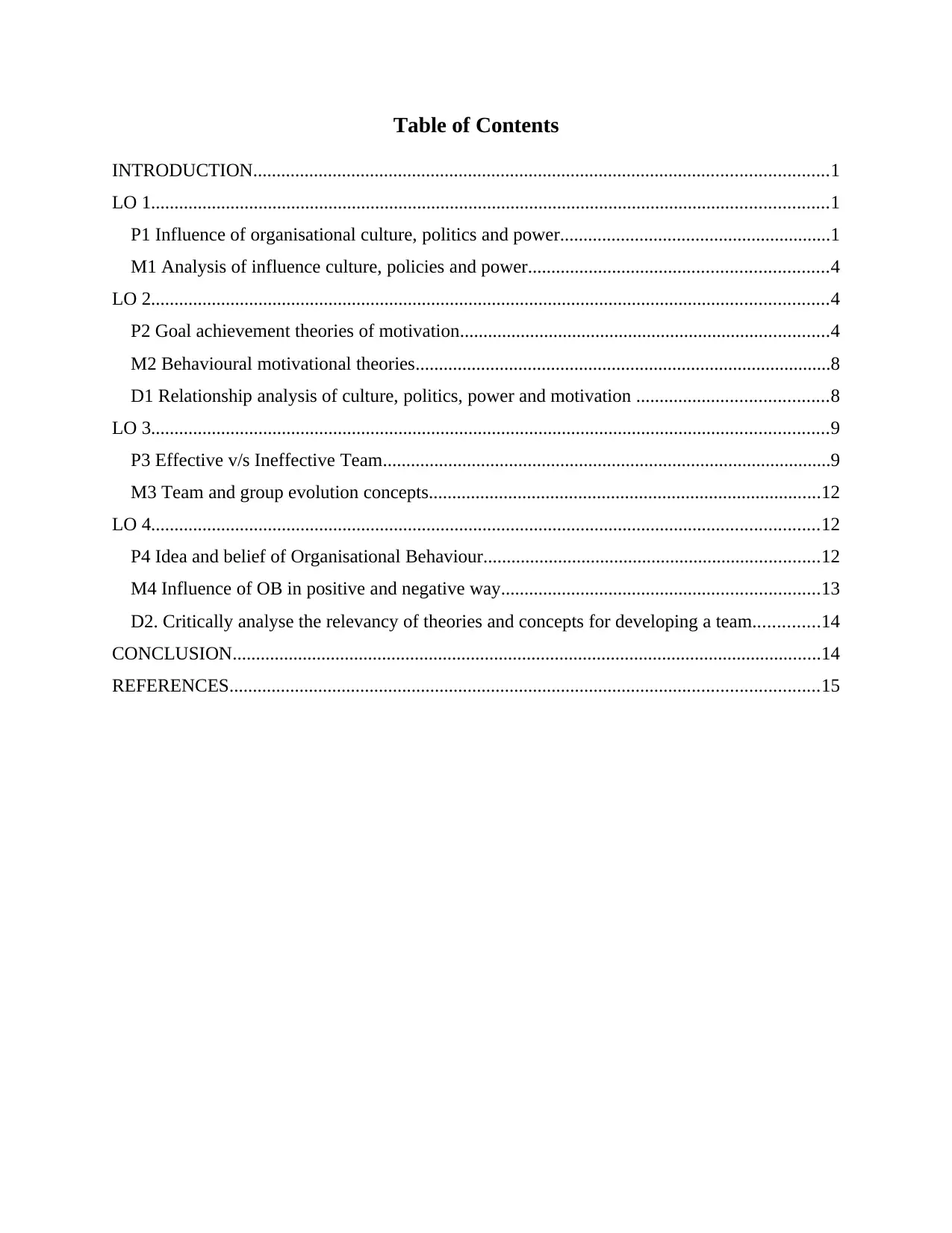
Table of Contents
INTRODUCTION...........................................................................................................................1
LO 1.................................................................................................................................................1
P1 Influence of organisational culture, politics and power..........................................................1
M1 Analysis of influence culture, policies and power................................................................4
LO 2.................................................................................................................................................4
P2 Goal achievement theories of motivation...............................................................................4
M2 Behavioural motivational theories.........................................................................................8
D1 Relationship analysis of culture, politics, power and motivation .........................................8
LO 3.................................................................................................................................................9
P3 Effective v/s Ineffective Team................................................................................................9
M3 Team and group evolution concepts....................................................................................12
LO 4...............................................................................................................................................12
P4 Idea and belief of Organisational Behaviour........................................................................12
M4 Influence of OB in positive and negative way....................................................................13
D2. Critically analyse the relevancy of theories and concepts for developing a team..............14
CONCLUSION..............................................................................................................................14
REFERENCES..............................................................................................................................15
INTRODUCTION...........................................................................................................................1
LO 1.................................................................................................................................................1
P1 Influence of organisational culture, politics and power..........................................................1
M1 Analysis of influence culture, policies and power................................................................4
LO 2.................................................................................................................................................4
P2 Goal achievement theories of motivation...............................................................................4
M2 Behavioural motivational theories.........................................................................................8
D1 Relationship analysis of culture, politics, power and motivation .........................................8
LO 3.................................................................................................................................................9
P3 Effective v/s Ineffective Team................................................................................................9
M3 Team and group evolution concepts....................................................................................12
LO 4...............................................................................................................................................12
P4 Idea and belief of Organisational Behaviour........................................................................12
M4 Influence of OB in positive and negative way....................................................................13
D2. Critically analyse the relevancy of theories and concepts for developing a team..............14
CONCLUSION..............................................................................................................................14
REFERENCES..............................................................................................................................15
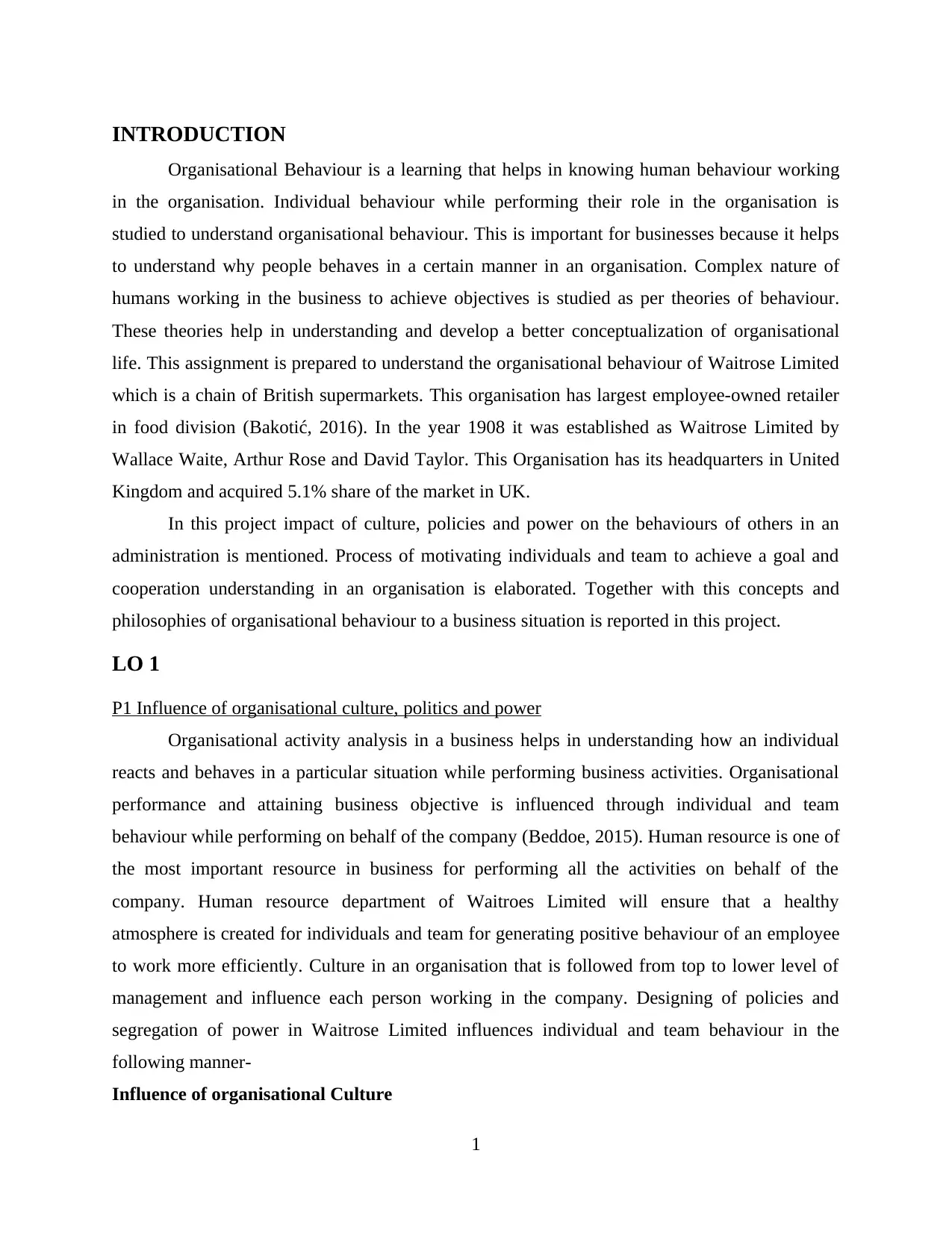
INTRODUCTION
Organisational Behaviour is a learning that helps in knowing human behaviour working
in the organisation. Individual behaviour while performing their role in the organisation is
studied to understand organisational behaviour. This is important for businesses because it helps
to understand why people behaves in a certain manner in an organisation. Complex nature of
humans working in the business to achieve objectives is studied as per theories of behaviour.
These theories help in understanding and develop a better conceptualization of organisational
life. This assignment is prepared to understand the organisational behaviour of Waitrose Limited
which is a chain of British supermarkets. This organisation has largest employee-owned retailer
in food division (Bakotić, 2016). In the year 1908 it was established as Waitrose Limited by
Wallace Waite, Arthur Rose and David Taylor. This Organisation has its headquarters in United
Kingdom and acquired 5.1% share of the market in UK.
In this project impact of culture, policies and power on the behaviours of others in an
administration is mentioned. Process of motivating individuals and team to achieve a goal and
cooperation understanding in an organisation is elaborated. Together with this concepts and
philosophies of organisational behaviour to a business situation is reported in this project.
LO 1
P1 Influence of organisational culture, politics and power
Organisational activity analysis in a business helps in understanding how an individual
reacts and behaves in a particular situation while performing business activities. Organisational
performance and attaining business objective is influenced through individual and team
behaviour while performing on behalf of the company (Beddoe, 2015). Human resource is one of
the most important resource in business for performing all the activities on behalf of the
company. Human resource department of Waitroes Limited will ensure that a healthy
atmosphere is created for individuals and team for generating positive behaviour of an employee
to work more efficiently. Culture in an organisation that is followed from top to lower level of
management and influence each person working in the company. Designing of policies and
segregation of power in Waitrose Limited influences individual and team behaviour in the
following manner-
Influence of organisational Culture
1
Organisational Behaviour is a learning that helps in knowing human behaviour working
in the organisation. Individual behaviour while performing their role in the organisation is
studied to understand organisational behaviour. This is important for businesses because it helps
to understand why people behaves in a certain manner in an organisation. Complex nature of
humans working in the business to achieve objectives is studied as per theories of behaviour.
These theories help in understanding and develop a better conceptualization of organisational
life. This assignment is prepared to understand the organisational behaviour of Waitrose Limited
which is a chain of British supermarkets. This organisation has largest employee-owned retailer
in food division (Bakotić, 2016). In the year 1908 it was established as Waitrose Limited by
Wallace Waite, Arthur Rose and David Taylor. This Organisation has its headquarters in United
Kingdom and acquired 5.1% share of the market in UK.
In this project impact of culture, policies and power on the behaviours of others in an
administration is mentioned. Process of motivating individuals and team to achieve a goal and
cooperation understanding in an organisation is elaborated. Together with this concepts and
philosophies of organisational behaviour to a business situation is reported in this project.
LO 1
P1 Influence of organisational culture, politics and power
Organisational activity analysis in a business helps in understanding how an individual
reacts and behaves in a particular situation while performing business activities. Organisational
performance and attaining business objective is influenced through individual and team
behaviour while performing on behalf of the company (Beddoe, 2015). Human resource is one of
the most important resource in business for performing all the activities on behalf of the
company. Human resource department of Waitroes Limited will ensure that a healthy
atmosphere is created for individuals and team for generating positive behaviour of an employee
to work more efficiently. Culture in an organisation that is followed from top to lower level of
management and influence each person working in the company. Designing of policies and
segregation of power in Waitrose Limited influences individual and team behaviour in the
following manner-
Influence of organisational Culture
1
⊘ This is a preview!⊘
Do you want full access?
Subscribe today to unlock all pages.

Trusted by 1+ million students worldwide
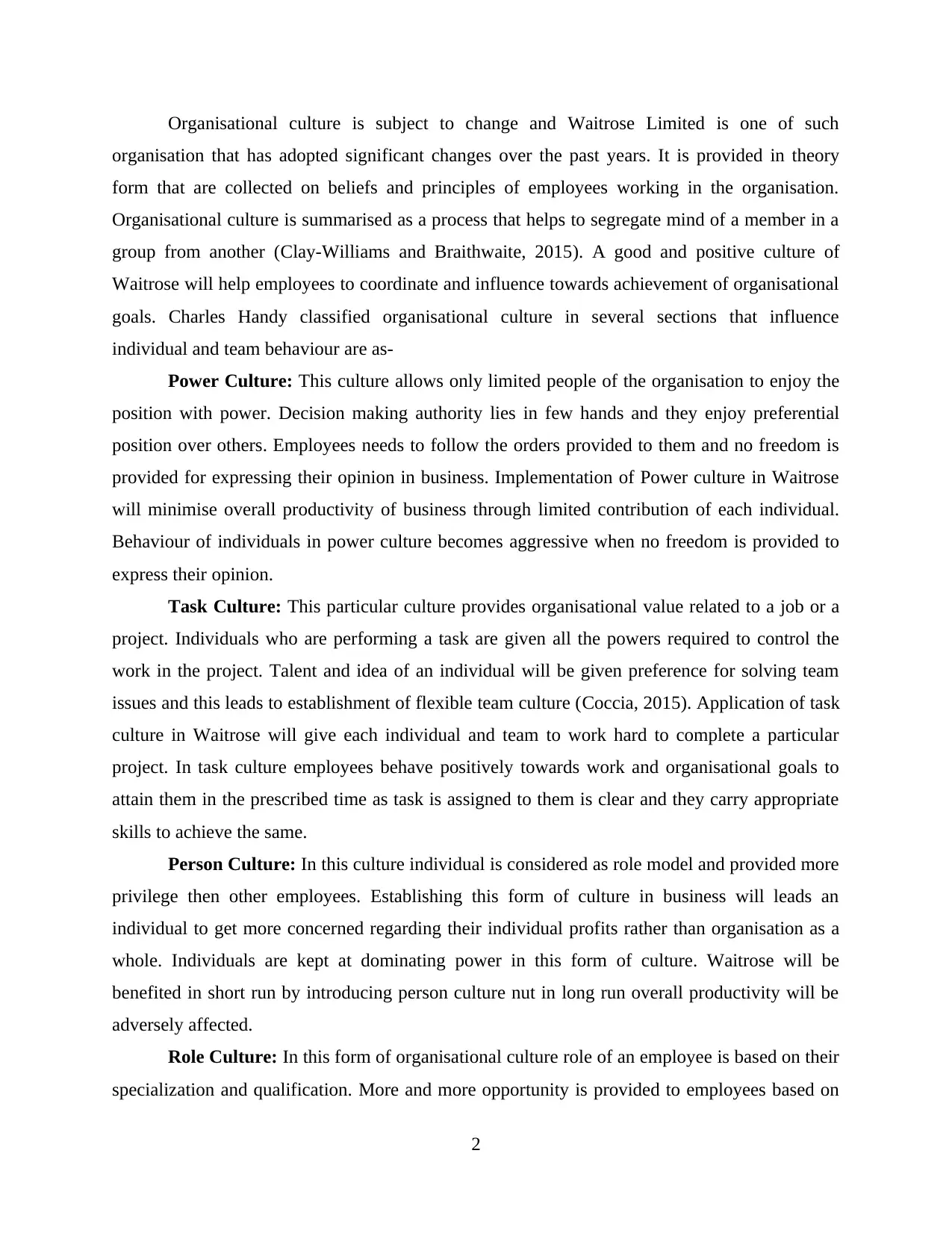
Organisational culture is subject to change and Waitrose Limited is one of such
organisation that has adopted significant changes over the past years. It is provided in theory
form that are collected on beliefs and principles of employees working in the organisation.
Organisational culture is summarised as a process that helps to segregate mind of a member in a
group from another (Clay-Williams and Braithwaite, 2015). A good and positive culture of
Waitrose will help employees to coordinate and influence towards achievement of organisational
goals. Charles Handy classified organisational culture in several sections that influence
individual and team behaviour are as-
Power Culture: This culture allows only limited people of the organisation to enjoy the
position with power. Decision making authority lies in few hands and they enjoy preferential
position over others. Employees needs to follow the orders provided to them and no freedom is
provided for expressing their opinion in business. Implementation of Power culture in Waitrose
will minimise overall productivity of business through limited contribution of each individual.
Behaviour of individuals in power culture becomes aggressive when no freedom is provided to
express their opinion.
Task Culture: This particular culture provides organisational value related to a job or a
project. Individuals who are performing a task are given all the powers required to control the
work in the project. Talent and idea of an individual will be given preference for solving team
issues and this leads to establishment of flexible team culture (Coccia, 2015). Application of task
culture in Waitrose will give each individual and team to work hard to complete a particular
project. In task culture employees behave positively towards work and organisational goals to
attain them in the prescribed time as task is assigned to them is clear and they carry appropriate
skills to achieve the same.
Person Culture: In this culture individual is considered as role model and provided more
privilege then other employees. Establishing this form of culture in business will leads an
individual to get more concerned regarding their individual profits rather than organisation as a
whole. Individuals are kept at dominating power in this form of culture. Waitrose will be
benefited in short run by introducing person culture nut in long run overall productivity will be
adversely affected.
Role Culture: In this form of organisational culture role of an employee is based on their
specialization and qualification. More and more opportunity is provided to employees based on
2
organisation that has adopted significant changes over the past years. It is provided in theory
form that are collected on beliefs and principles of employees working in the organisation.
Organisational culture is summarised as a process that helps to segregate mind of a member in a
group from another (Clay-Williams and Braithwaite, 2015). A good and positive culture of
Waitrose will help employees to coordinate and influence towards achievement of organisational
goals. Charles Handy classified organisational culture in several sections that influence
individual and team behaviour are as-
Power Culture: This culture allows only limited people of the organisation to enjoy the
position with power. Decision making authority lies in few hands and they enjoy preferential
position over others. Employees needs to follow the orders provided to them and no freedom is
provided for expressing their opinion in business. Implementation of Power culture in Waitrose
will minimise overall productivity of business through limited contribution of each individual.
Behaviour of individuals in power culture becomes aggressive when no freedom is provided to
express their opinion.
Task Culture: This particular culture provides organisational value related to a job or a
project. Individuals who are performing a task are given all the powers required to control the
work in the project. Talent and idea of an individual will be given preference for solving team
issues and this leads to establishment of flexible team culture (Coccia, 2015). Application of task
culture in Waitrose will give each individual and team to work hard to complete a particular
project. In task culture employees behave positively towards work and organisational goals to
attain them in the prescribed time as task is assigned to them is clear and they carry appropriate
skills to achieve the same.
Person Culture: In this culture individual is considered as role model and provided more
privilege then other employees. Establishing this form of culture in business will leads an
individual to get more concerned regarding their individual profits rather than organisation as a
whole. Individuals are kept at dominating power in this form of culture. Waitrose will be
benefited in short run by introducing person culture nut in long run overall productivity will be
adversely affected.
Role Culture: In this form of organisational culture role of an employee is based on their
specialization and qualification. More and more opportunity is provided to employees based on
2
Paraphrase This Document
Need a fresh take? Get an instant paraphrase of this document with our AI Paraphraser
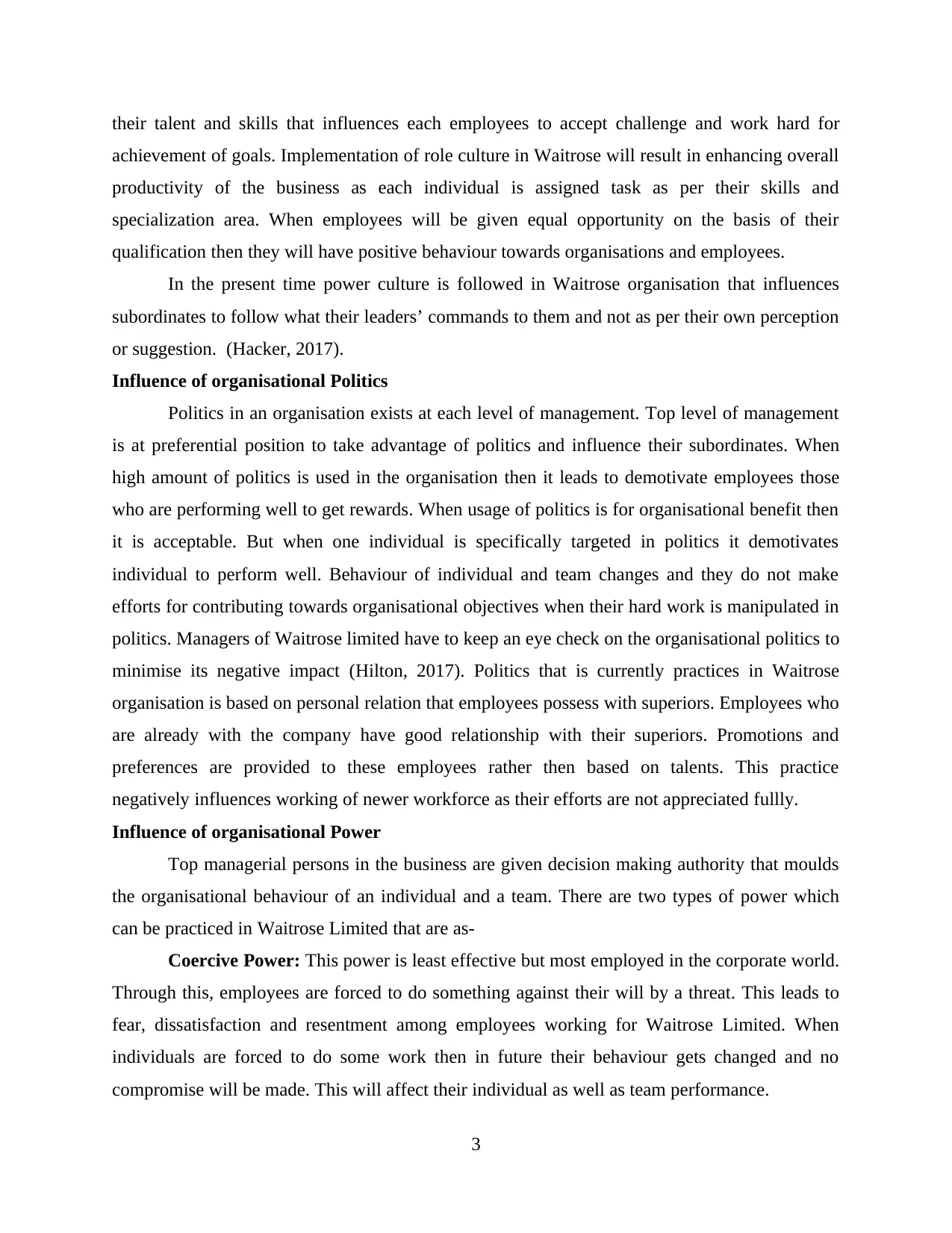
their talent and skills that influences each employees to accept challenge and work hard for
achievement of goals. Implementation of role culture in Waitrose will result in enhancing overall
productivity of the business as each individual is assigned task as per their skills and
specialization area. When employees will be given equal opportunity on the basis of their
qualification then they will have positive behaviour towards organisations and employees.
In the present time power culture is followed in Waitrose organisation that influences
subordinates to follow what their leaders’ commands to them and not as per their own perception
or suggestion. (Hacker, 2017).
Influence of organisational Politics
Politics in an organisation exists at each level of management. Top level of management
is at preferential position to take advantage of politics and influence their subordinates. When
high amount of politics is used in the organisation then it leads to demotivate employees those
who are performing well to get rewards. When usage of politics is for organisational benefit then
it is acceptable. But when one individual is specifically targeted in politics it demotivates
individual to perform well. Behaviour of individual and team changes and they do not make
efforts for contributing towards organisational objectives when their hard work is manipulated in
politics. Managers of Waitrose limited have to keep an eye check on the organisational politics to
minimise its negative impact (Hilton, 2017). Politics that is currently practices in Waitrose
organisation is based on personal relation that employees possess with superiors. Employees who
are already with the company have good relationship with their superiors. Promotions and
preferences are provided to these employees rather then based on talents. This practice
negatively influences working of newer workforce as their efforts are not appreciated fullly.
Influence of organisational Power
Top managerial persons in the business are given decision making authority that moulds
the organisational behaviour of an individual and a team. There are two types of power which
can be practiced in Waitrose Limited that are as-
Coercive Power: This power is least effective but most employed in the corporate world.
Through this, employees are forced to do something against their will by a threat. This leads to
fear, dissatisfaction and resentment among employees working for Waitrose Limited. When
individuals are forced to do some work then in future their behaviour gets changed and no
compromise will be made. This will affect their individual as well as team performance.
3
achievement of goals. Implementation of role culture in Waitrose will result in enhancing overall
productivity of the business as each individual is assigned task as per their skills and
specialization area. When employees will be given equal opportunity on the basis of their
qualification then they will have positive behaviour towards organisations and employees.
In the present time power culture is followed in Waitrose organisation that influences
subordinates to follow what their leaders’ commands to them and not as per their own perception
or suggestion. (Hacker, 2017).
Influence of organisational Politics
Politics in an organisation exists at each level of management. Top level of management
is at preferential position to take advantage of politics and influence their subordinates. When
high amount of politics is used in the organisation then it leads to demotivate employees those
who are performing well to get rewards. When usage of politics is for organisational benefit then
it is acceptable. But when one individual is specifically targeted in politics it demotivates
individual to perform well. Behaviour of individual and team changes and they do not make
efforts for contributing towards organisational objectives when their hard work is manipulated in
politics. Managers of Waitrose limited have to keep an eye check on the organisational politics to
minimise its negative impact (Hilton, 2017). Politics that is currently practices in Waitrose
organisation is based on personal relation that employees possess with superiors. Employees who
are already with the company have good relationship with their superiors. Promotions and
preferences are provided to these employees rather then based on talents. This practice
negatively influences working of newer workforce as their efforts are not appreciated fullly.
Influence of organisational Power
Top managerial persons in the business are given decision making authority that moulds
the organisational behaviour of an individual and a team. There are two types of power which
can be practiced in Waitrose Limited that are as-
Coercive Power: This power is least effective but most employed in the corporate world.
Through this, employees are forced to do something against their will by a threat. This leads to
fear, dissatisfaction and resentment among employees working for Waitrose Limited. When
individuals are forced to do some work then in future their behaviour gets changed and no
compromise will be made. This will affect their individual as well as team performance.
3
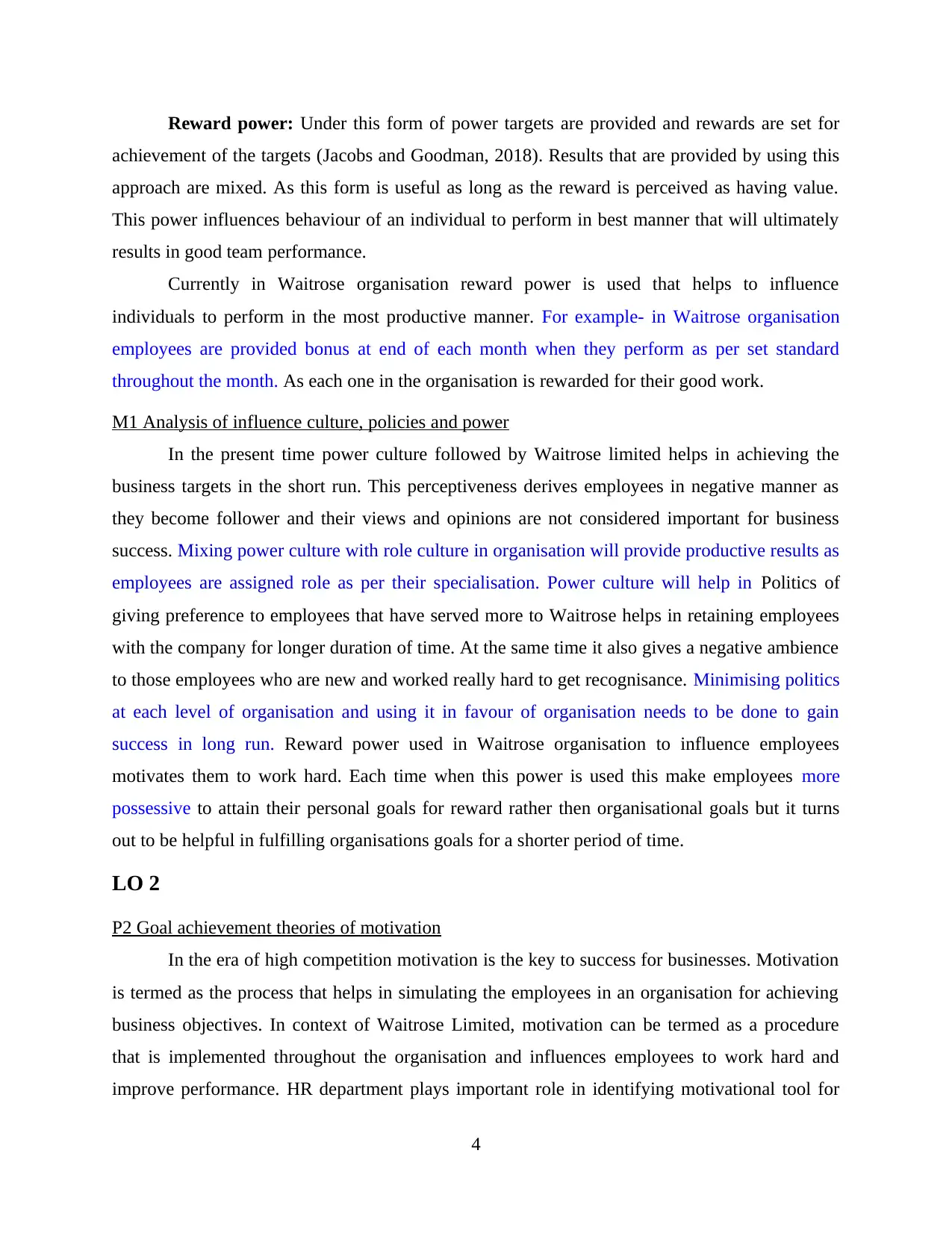
Reward power: Under this form of power targets are provided and rewards are set for
achievement of the targets (Jacobs and Goodman, 2018). Results that are provided by using this
approach are mixed. As this form is useful as long as the reward is perceived as having value.
This power influences behaviour of an individual to perform in best manner that will ultimately
results in good team performance.
Currently in Waitrose organisation reward power is used that helps to influence
individuals to perform in the most productive manner. For example- in Waitrose organisation
employees are provided bonus at end of each month when they perform as per set standard
throughout the month. As each one in the organisation is rewarded for their good work.
M1 Analysis of influence culture, policies and power
In the present time power culture followed by Waitrose limited helps in achieving the
business targets in the short run. This perceptiveness derives employees in negative manner as
they become follower and their views and opinions are not considered important for business
success. Mixing power culture with role culture in organisation will provide productive results as
employees are assigned role as per their specialisation. Power culture will help in Politics of
giving preference to employees that have served more to Waitrose helps in retaining employees
with the company for longer duration of time. At the same time it also gives a negative ambience
to those employees who are new and worked really hard to get recognisance. Minimising politics
at each level of organisation and using it in favour of organisation needs to be done to gain
success in long run. Reward power used in Waitrose organisation to influence employees
motivates them to work hard. Each time when this power is used this make employees more
possessive to attain their personal goals for reward rather then organisational goals but it turns
out to be helpful in fulfilling organisations goals for a shorter period of time.
LO 2
P2 Goal achievement theories of motivation
In the era of high competition motivation is the key to success for businesses. Motivation
is termed as the process that helps in simulating the employees in an organisation for achieving
business objectives. In context of Waitrose Limited, motivation can be termed as a procedure
that is implemented throughout the organisation and influences employees to work hard and
improve performance. HR department plays important role in identifying motivational tool for
4
achievement of the targets (Jacobs and Goodman, 2018). Results that are provided by using this
approach are mixed. As this form is useful as long as the reward is perceived as having value.
This power influences behaviour of an individual to perform in best manner that will ultimately
results in good team performance.
Currently in Waitrose organisation reward power is used that helps to influence
individuals to perform in the most productive manner. For example- in Waitrose organisation
employees are provided bonus at end of each month when they perform as per set standard
throughout the month. As each one in the organisation is rewarded for their good work.
M1 Analysis of influence culture, policies and power
In the present time power culture followed by Waitrose limited helps in achieving the
business targets in the short run. This perceptiveness derives employees in negative manner as
they become follower and their views and opinions are not considered important for business
success. Mixing power culture with role culture in organisation will provide productive results as
employees are assigned role as per their specialisation. Power culture will help in Politics of
giving preference to employees that have served more to Waitrose helps in retaining employees
with the company for longer duration of time. At the same time it also gives a negative ambience
to those employees who are new and worked really hard to get recognisance. Minimising politics
at each level of organisation and using it in favour of organisation needs to be done to gain
success in long run. Reward power used in Waitrose organisation to influence employees
motivates them to work hard. Each time when this power is used this make employees more
possessive to attain their personal goals for reward rather then organisational goals but it turns
out to be helpful in fulfilling organisations goals for a shorter period of time.
LO 2
P2 Goal achievement theories of motivation
In the era of high competition motivation is the key to success for businesses. Motivation
is termed as the process that helps in simulating the employees in an organisation for achieving
business objectives. In context of Waitrose Limited, motivation can be termed as a procedure
that is implemented throughout the organisation and influences employees to work hard and
improve performance. HR department plays important role in identifying motivational tool for
4
⊘ This is a preview!⊘
Do you want full access?
Subscribe today to unlock all pages.

Trusted by 1+ million students worldwide
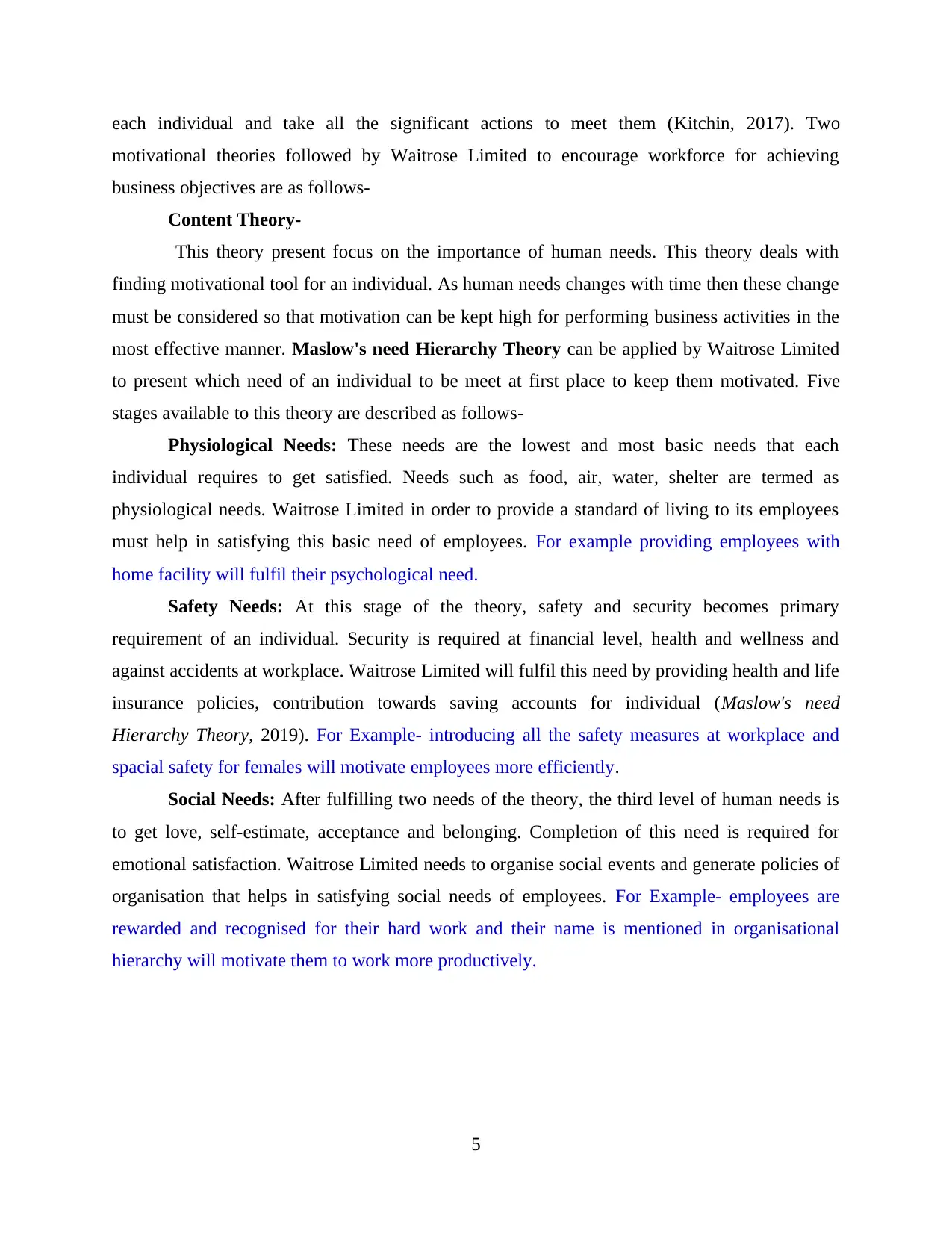
each individual and take all the significant actions to meet them (Kitchin, 2017). Two
motivational theories followed by Waitrose Limited to encourage workforce for achieving
business objectives are as follows-
Content Theory-
This theory present focus on the importance of human needs. This theory deals with
finding motivational tool for an individual. As human needs changes with time then these change
must be considered so that motivation can be kept high for performing business activities in the
most effective manner. Maslow's need Hierarchy Theory can be applied by Waitrose Limited
to present which need of an individual to be meet at first place to keep them motivated. Five
stages available to this theory are described as follows-
Physiological Needs: These needs are the lowest and most basic needs that each
individual requires to get satisfied. Needs such as food, air, water, shelter are termed as
physiological needs. Waitrose Limited in order to provide a standard of living to its employees
must help in satisfying this basic need of employees. For example providing employees with
home facility will fulfil their psychological need.
Safety Needs: At this stage of the theory, safety and security becomes primary
requirement of an individual. Security is required at financial level, health and wellness and
against accidents at workplace. Waitrose Limited will fulfil this need by providing health and life
insurance policies, contribution towards saving accounts for individual (Maslow's need
Hierarchy Theory, 2019). For Example- introducing all the safety measures at workplace and
spacial safety for females will motivate employees more efficiently.
Social Needs: After fulfilling two needs of the theory, the third level of human needs is
to get love, self-estimate, acceptance and belonging. Completion of this need is required for
emotional satisfaction. Waitrose Limited needs to organise social events and generate policies of
organisation that helps in satisfying social needs of employees. For Example- employees are
rewarded and recognised for their hard work and their name is mentioned in organisational
hierarchy will motivate them to work more productively.
5
motivational theories followed by Waitrose Limited to encourage workforce for achieving
business objectives are as follows-
Content Theory-
This theory present focus on the importance of human needs. This theory deals with
finding motivational tool for an individual. As human needs changes with time then these change
must be considered so that motivation can be kept high for performing business activities in the
most effective manner. Maslow's need Hierarchy Theory can be applied by Waitrose Limited
to present which need of an individual to be meet at first place to keep them motivated. Five
stages available to this theory are described as follows-
Physiological Needs: These needs are the lowest and most basic needs that each
individual requires to get satisfied. Needs such as food, air, water, shelter are termed as
physiological needs. Waitrose Limited in order to provide a standard of living to its employees
must help in satisfying this basic need of employees. For example providing employees with
home facility will fulfil their psychological need.
Safety Needs: At this stage of the theory, safety and security becomes primary
requirement of an individual. Security is required at financial level, health and wellness and
against accidents at workplace. Waitrose Limited will fulfil this need by providing health and life
insurance policies, contribution towards saving accounts for individual (Maslow's need
Hierarchy Theory, 2019). For Example- introducing all the safety measures at workplace and
spacial safety for females will motivate employees more efficiently.
Social Needs: After fulfilling two needs of the theory, the third level of human needs is
to get love, self-estimate, acceptance and belonging. Completion of this need is required for
emotional satisfaction. Waitrose Limited needs to organise social events and generate policies of
organisation that helps in satisfying social needs of employees. For Example- employees are
rewarded and recognised for their hard work and their name is mentioned in organisational
hierarchy will motivate them to work more productively.
5
Paraphrase This Document
Need a fresh take? Get an instant paraphrase of this document with our AI Paraphraser
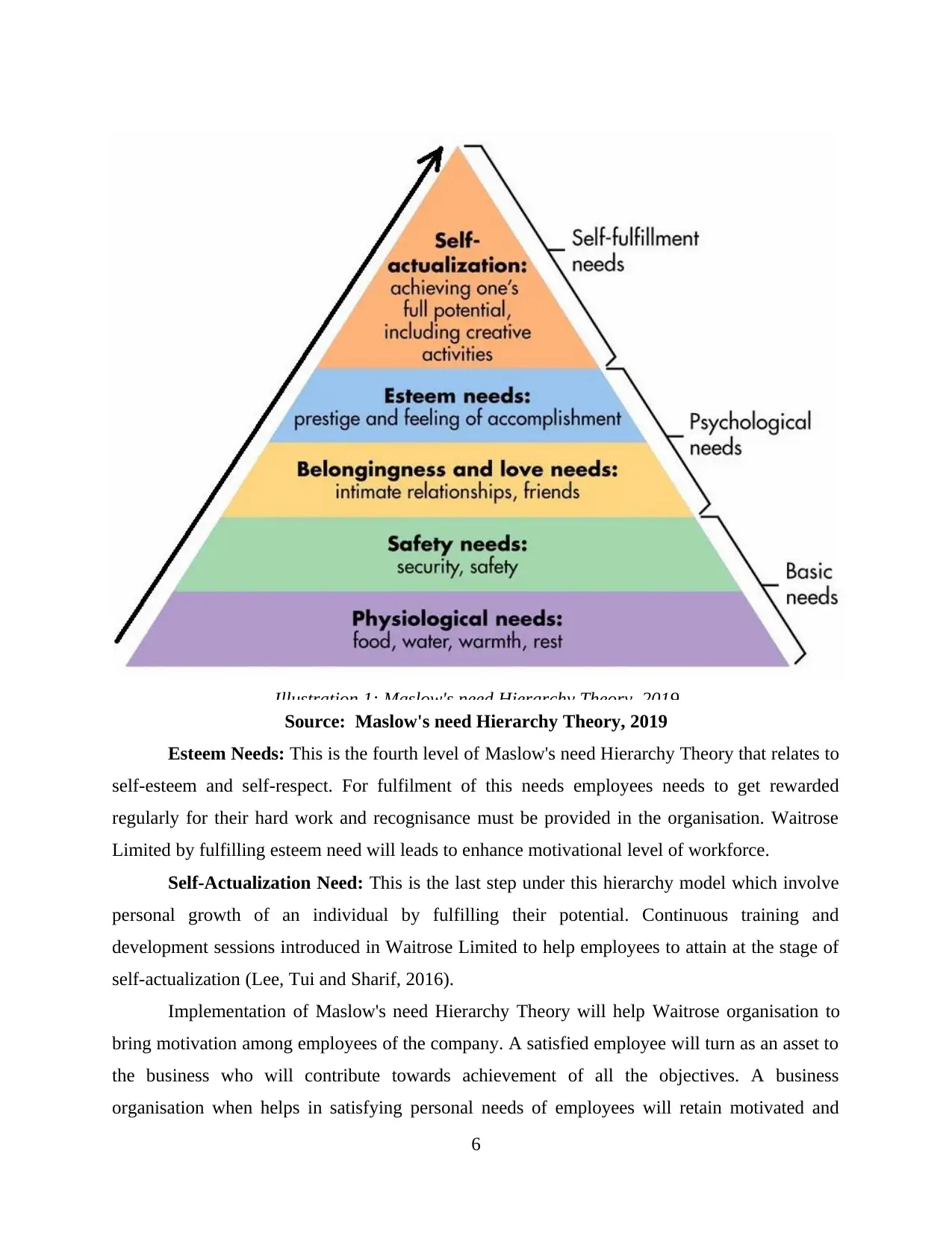
Source: Maslow's need Hierarchy Theory, 2019
Esteem Needs: This is the fourth level of Maslow's need Hierarchy Theory that relates to
self-esteem and self-respect. For fulfilment of this needs employees needs to get rewarded
regularly for their hard work and recognisance must be provided in the organisation. Waitrose
Limited by fulfilling esteem need will leads to enhance motivational level of workforce.
Self-Actualization Need: This is the last step under this hierarchy model which involve
personal growth of an individual by fulfilling their potential. Continuous training and
development sessions introduced in Waitrose Limited to help employees to attain at the stage of
self-actualization (Lee, Tui and Sharif, 2016).
Implementation of Maslow's need Hierarchy Theory will help Waitrose organisation to
bring motivation among employees of the company. A satisfied employee will turn as an asset to
the business who will contribute towards achievement of all the objectives. A business
organisation when helps in satisfying personal needs of employees will retain motivated and
6
Illustration 1: Maslow's need Hierarchy Theory, 2019
Esteem Needs: This is the fourth level of Maslow's need Hierarchy Theory that relates to
self-esteem and self-respect. For fulfilment of this needs employees needs to get rewarded
regularly for their hard work and recognisance must be provided in the organisation. Waitrose
Limited by fulfilling esteem need will leads to enhance motivational level of workforce.
Self-Actualization Need: This is the last step under this hierarchy model which involve
personal growth of an individual by fulfilling their potential. Continuous training and
development sessions introduced in Waitrose Limited to help employees to attain at the stage of
self-actualization (Lee, Tui and Sharif, 2016).
Implementation of Maslow's need Hierarchy Theory will help Waitrose organisation to
bring motivation among employees of the company. A satisfied employee will turn as an asset to
the business who will contribute towards achievement of all the objectives. A business
organisation when helps in satisfying personal needs of employees will retain motivated and
6
Illustration 1: Maslow's need Hierarchy Theory, 2019
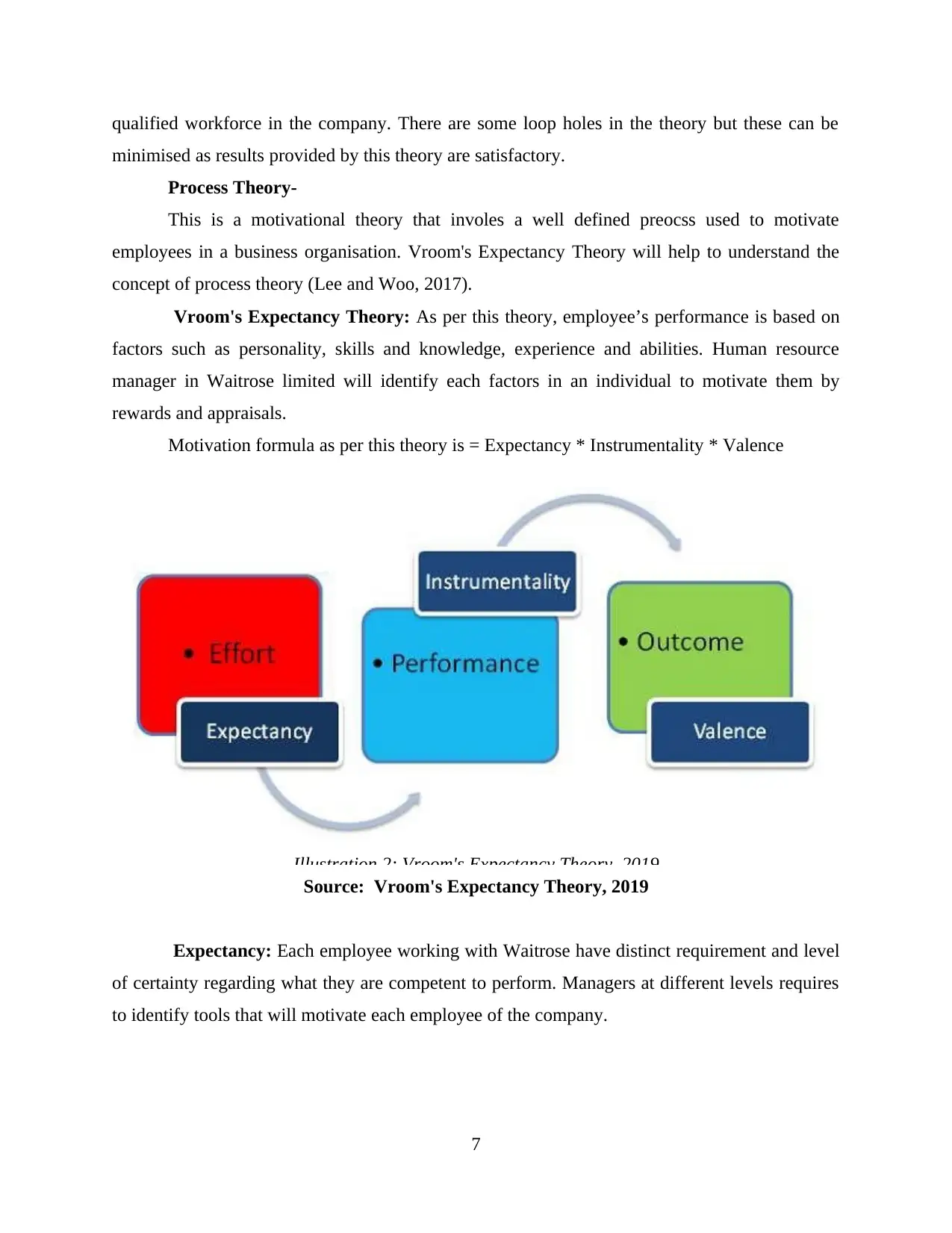
qualified workforce in the company. There are some loop holes in the theory but these can be
minimised as results provided by this theory are satisfactory.
Process Theory-
This is a motivational theory that involes a well defined preocss used to motivate
employees in a business organisation. Vroom's Expectancy Theory will help to understand the
concept of process theory (Lee and Woo, 2017).
Vroom's Expectancy Theory: As per this theory, employee’s performance is based on
factors such as personality, skills and knowledge, experience and abilities. Human resource
manager in Waitrose limited will identify each factors in an individual to motivate them by
rewards and appraisals.
Motivation formula as per this theory is = Expectancy * Instrumentality * Valence
Source: Vroom's Expectancy Theory, 2019
Expectancy: Each employee working with Waitrose have distinct requirement and level
of certainty regarding what they are competent to perform. Managers at different levels requires
to identify tools that will motivate each employee of the company.
7
Illustration 2: Vroom's Expectancy Theory, 2019
minimised as results provided by this theory are satisfactory.
Process Theory-
This is a motivational theory that involes a well defined preocss used to motivate
employees in a business organisation. Vroom's Expectancy Theory will help to understand the
concept of process theory (Lee and Woo, 2017).
Vroom's Expectancy Theory: As per this theory, employee’s performance is based on
factors such as personality, skills and knowledge, experience and abilities. Human resource
manager in Waitrose limited will identify each factors in an individual to motivate them by
rewards and appraisals.
Motivation formula as per this theory is = Expectancy * Instrumentality * Valence
Source: Vroom's Expectancy Theory, 2019
Expectancy: Each employee working with Waitrose have distinct requirement and level
of certainty regarding what they are competent to perform. Managers at different levels requires
to identify tools that will motivate each employee of the company.
7
Illustration 2: Vroom's Expectancy Theory, 2019
⊘ This is a preview!⊘
Do you want full access?
Subscribe today to unlock all pages.

Trusted by 1+ million students worldwide
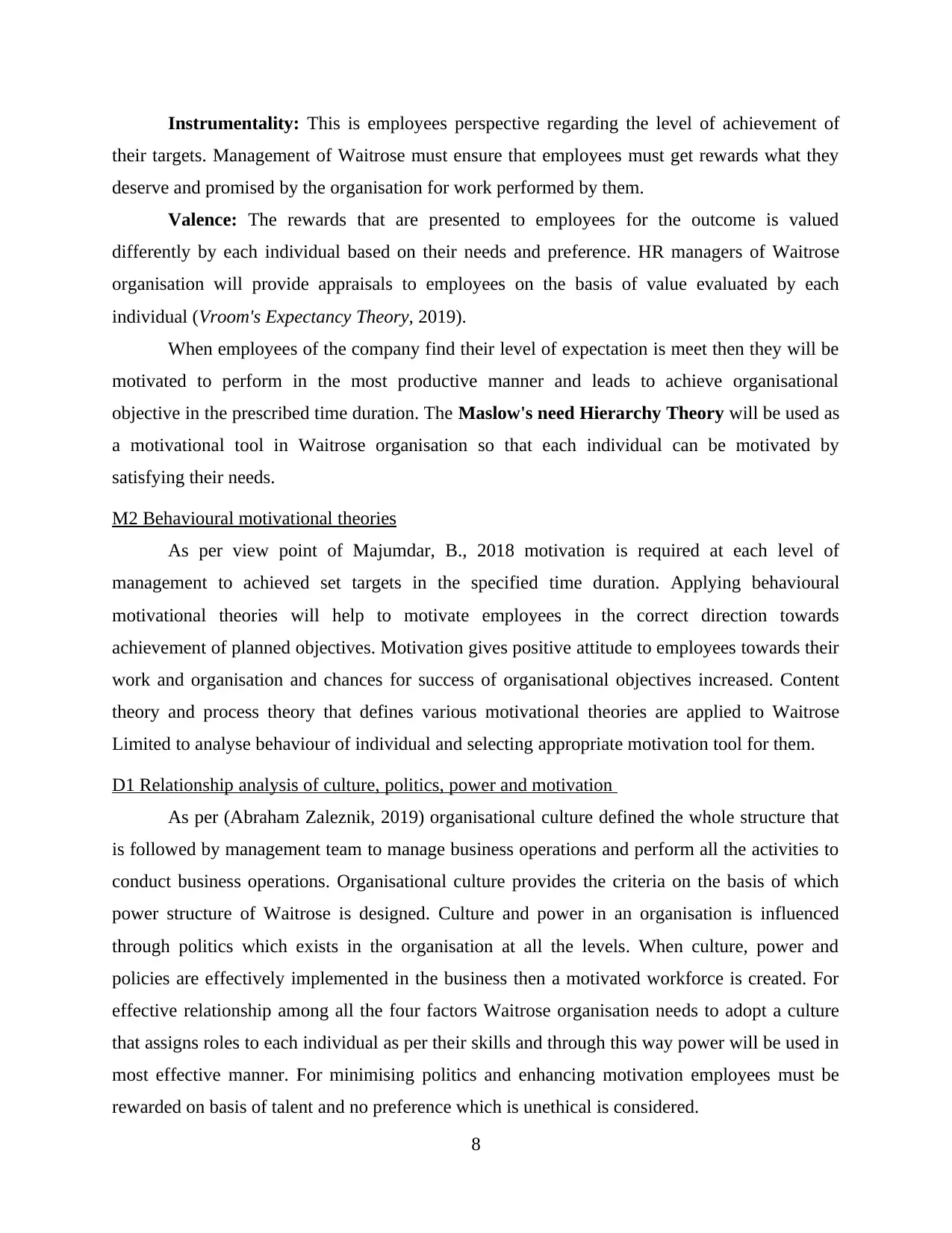
Instrumentality: This is employees perspective regarding the level of achievement of
their targets. Management of Waitrose must ensure that employees must get rewards what they
deserve and promised by the organisation for work performed by them.
Valence: The rewards that are presented to employees for the outcome is valued
differently by each individual based on their needs and preference. HR managers of Waitrose
organisation will provide appraisals to employees on the basis of value evaluated by each
individual (Vroom's Expectancy Theory, 2019).
When employees of the company find their level of expectation is meet then they will be
motivated to perform in the most productive manner and leads to achieve organisational
objective in the prescribed time duration. The Maslow's need Hierarchy Theory will be used as
a motivational tool in Waitrose organisation so that each individual can be motivated by
satisfying their needs.
M2 Behavioural motivational theories
As per view point of Majumdar, B., 2018 motivation is required at each level of
management to achieved set targets in the specified time duration. Applying behavioural
motivational theories will help to motivate employees in the correct direction towards
achievement of planned objectives. Motivation gives positive attitude to employees towards their
work and organisation and chances for success of organisational objectives increased. Content
theory and process theory that defines various motivational theories are applied to Waitrose
Limited to analyse behaviour of individual and selecting appropriate motivation tool for them.
D1 Relationship analysis of culture, politics, power and motivation
As per (Abraham Zaleznik, 2019) organisational culture defined the whole structure that
is followed by management team to manage business operations and perform all the activities to
conduct business operations. Organisational culture provides the criteria on the basis of which
power structure of Waitrose is designed. Culture and power in an organisation is influenced
through politics which exists in the organisation at all the levels. When culture, power and
policies are effectively implemented in the business then a motivated workforce is created. For
effective relationship among all the four factors Waitrose organisation needs to adopt a culture
that assigns roles to each individual as per their skills and through this way power will be used in
most effective manner. For minimising politics and enhancing motivation employees must be
rewarded on basis of talent and no preference which is unethical is considered.
8
their targets. Management of Waitrose must ensure that employees must get rewards what they
deserve and promised by the organisation for work performed by them.
Valence: The rewards that are presented to employees for the outcome is valued
differently by each individual based on their needs and preference. HR managers of Waitrose
organisation will provide appraisals to employees on the basis of value evaluated by each
individual (Vroom's Expectancy Theory, 2019).
When employees of the company find their level of expectation is meet then they will be
motivated to perform in the most productive manner and leads to achieve organisational
objective in the prescribed time duration. The Maslow's need Hierarchy Theory will be used as
a motivational tool in Waitrose organisation so that each individual can be motivated by
satisfying their needs.
M2 Behavioural motivational theories
As per view point of Majumdar, B., 2018 motivation is required at each level of
management to achieved set targets in the specified time duration. Applying behavioural
motivational theories will help to motivate employees in the correct direction towards
achievement of planned objectives. Motivation gives positive attitude to employees towards their
work and organisation and chances for success of organisational objectives increased. Content
theory and process theory that defines various motivational theories are applied to Waitrose
Limited to analyse behaviour of individual and selecting appropriate motivation tool for them.
D1 Relationship analysis of culture, politics, power and motivation
As per (Abraham Zaleznik, 2019) organisational culture defined the whole structure that
is followed by management team to manage business operations and perform all the activities to
conduct business operations. Organisational culture provides the criteria on the basis of which
power structure of Waitrose is designed. Culture and power in an organisation is influenced
through politics which exists in the organisation at all the levels. When culture, power and
policies are effectively implemented in the business then a motivated workforce is created. For
effective relationship among all the four factors Waitrose organisation needs to adopt a culture
that assigns roles to each individual as per their skills and through this way power will be used in
most effective manner. For minimising politics and enhancing motivation employees must be
rewarded on basis of talent and no preference which is unethical is considered.
8
Paraphrase This Document
Need a fresh take? Get an instant paraphrase of this document with our AI Paraphraser
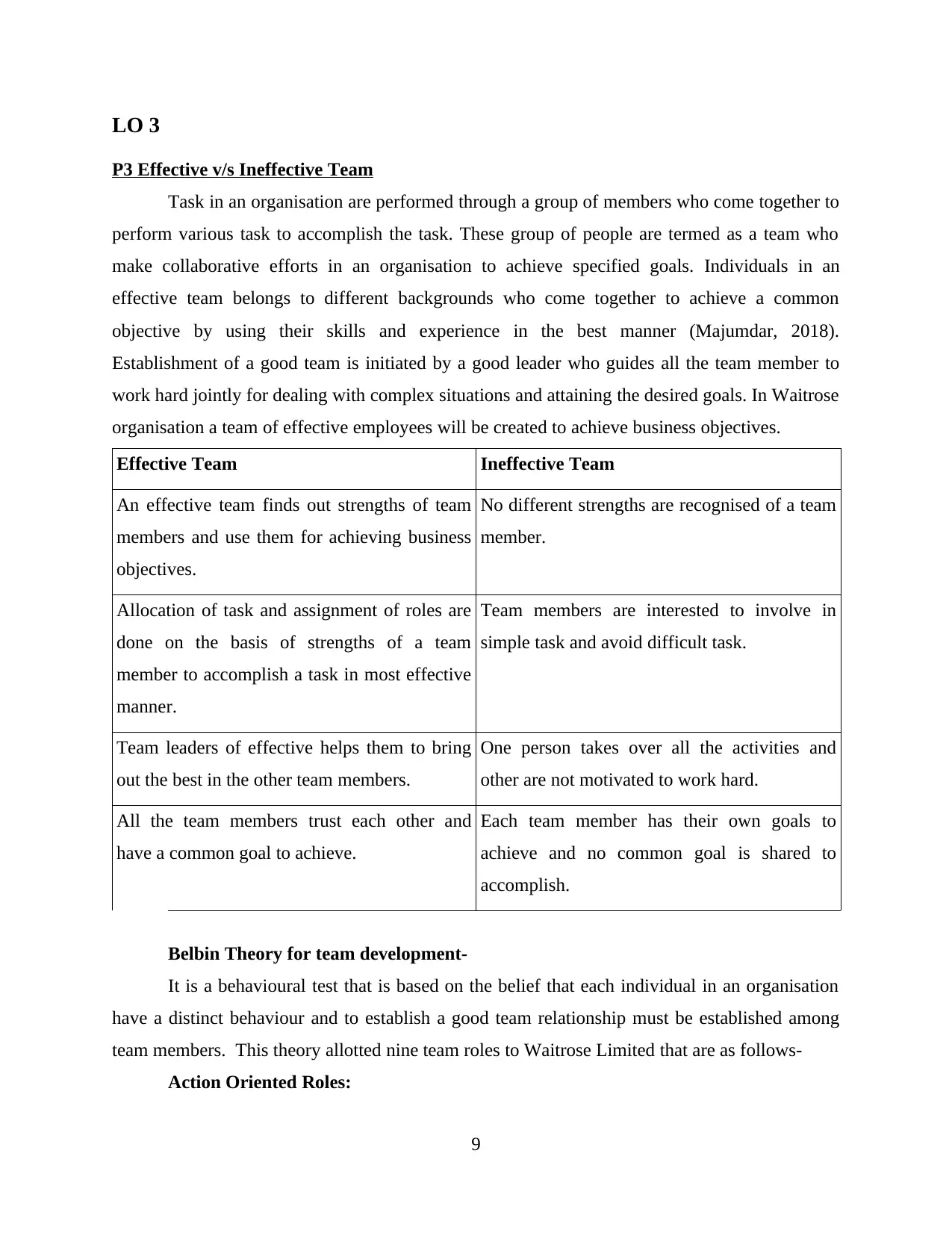
LO 3
P3 Effective v/s Ineffective Team
Task in an organisation are performed through a group of members who come together to
perform various task to accomplish the task. These group of people are termed as a team who
make collaborative efforts in an organisation to achieve specified goals. Individuals in an
effective team belongs to different backgrounds who come together to achieve a common
objective by using their skills and experience in the best manner (Majumdar, 2018).
Establishment of a good team is initiated by a good leader who guides all the team member to
work hard jointly for dealing with complex situations and attaining the desired goals. In Waitrose
organisation a team of effective employees will be created to achieve business objectives.
Effective Team Ineffective Team
An effective team finds out strengths of team
members and use them for achieving business
objectives.
No different strengths are recognised of a team
member.
Allocation of task and assignment of roles are
done on the basis of strengths of a team
member to accomplish a task in most effective
manner.
Team members are interested to involve in
simple task and avoid difficult task.
Team leaders of effective helps them to bring
out the best in the other team members.
One person takes over all the activities and
other are not motivated to work hard.
All the team members trust each other and
have a common goal to achieve.
Each team member has their own goals to
achieve and no common goal is shared to
accomplish.
Belbin Theory for team development-
It is a behavioural test that is based on the belief that each individual in an organisation
have a distinct behaviour and to establish a good team relationship must be established among
team members. This theory allotted nine team roles to Waitrose Limited that are as follows-
Action Oriented Roles:
9
P3 Effective v/s Ineffective Team
Task in an organisation are performed through a group of members who come together to
perform various task to accomplish the task. These group of people are termed as a team who
make collaborative efforts in an organisation to achieve specified goals. Individuals in an
effective team belongs to different backgrounds who come together to achieve a common
objective by using their skills and experience in the best manner (Majumdar, 2018).
Establishment of a good team is initiated by a good leader who guides all the team member to
work hard jointly for dealing with complex situations and attaining the desired goals. In Waitrose
organisation a team of effective employees will be created to achieve business objectives.
Effective Team Ineffective Team
An effective team finds out strengths of team
members and use them for achieving business
objectives.
No different strengths are recognised of a team
member.
Allocation of task and assignment of roles are
done on the basis of strengths of a team
member to accomplish a task in most effective
manner.
Team members are interested to involve in
simple task and avoid difficult task.
Team leaders of effective helps them to bring
out the best in the other team members.
One person takes over all the activities and
other are not motivated to work hard.
All the team members trust each other and
have a common goal to achieve.
Each team member has their own goals to
achieve and no common goal is shared to
accomplish.
Belbin Theory for team development-
It is a behavioural test that is based on the belief that each individual in an organisation
have a distinct behaviour and to establish a good team relationship must be established among
team members. This theory allotted nine team roles to Waitrose Limited that are as follows-
Action Oriented Roles:
9
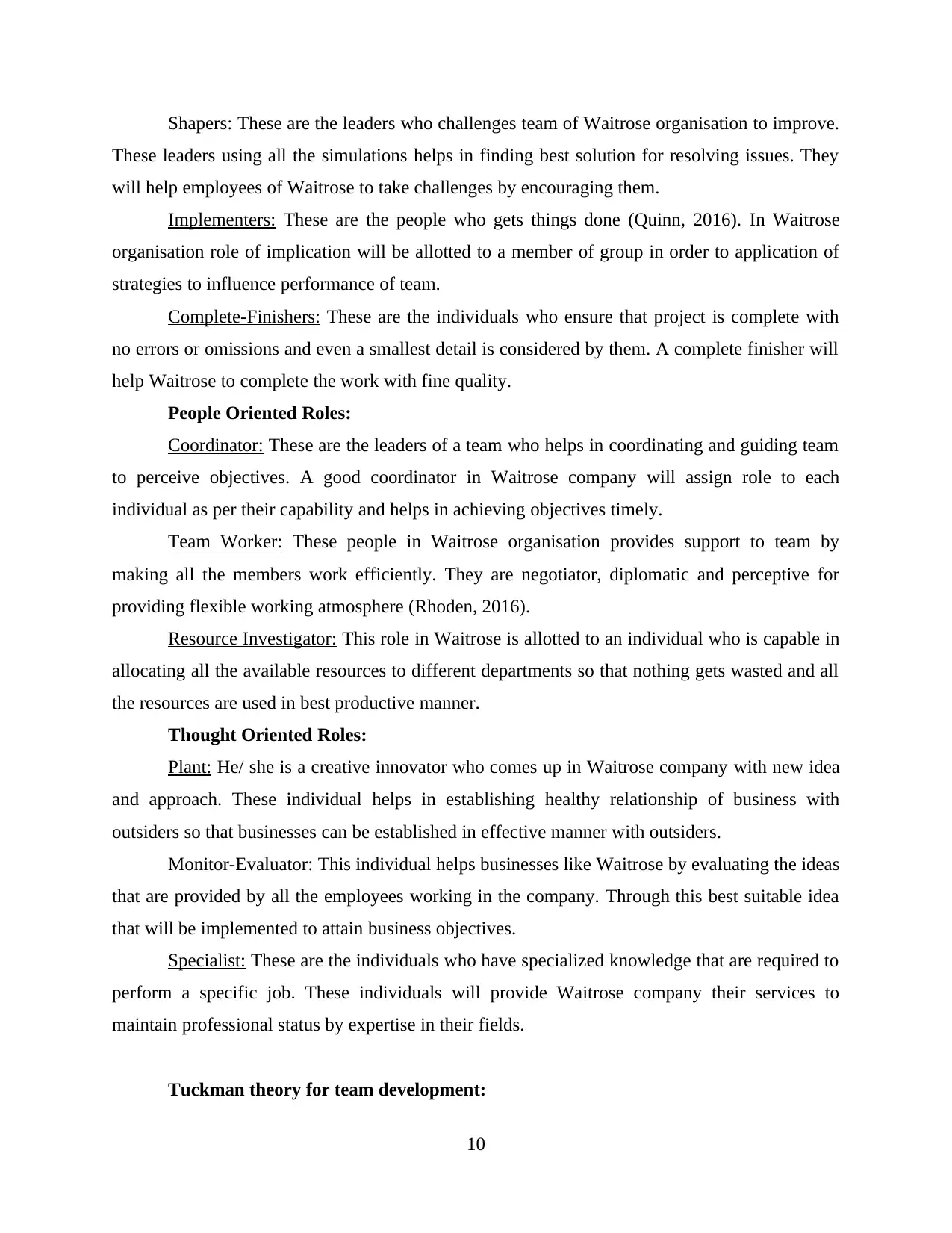
Shapers: These are the leaders who challenges team of Waitrose organisation to improve.
These leaders using all the simulations helps in finding best solution for resolving issues. They
will help employees of Waitrose to take challenges by encouraging them.
Implementers: These are the people who gets things done (Quinn, 2016). In Waitrose
organisation role of implication will be allotted to a member of group in order to application of
strategies to influence performance of team.
Complete-Finishers: These are the individuals who ensure that project is complete with
no errors or omissions and even a smallest detail is considered by them. A complete finisher will
help Waitrose to complete the work with fine quality.
People Oriented Roles:
Coordinator: These are the leaders of a team who helps in coordinating and guiding team
to perceive objectives. A good coordinator in Waitrose company will assign role to each
individual as per their capability and helps in achieving objectives timely.
Team Worker: These people in Waitrose organisation provides support to team by
making all the members work efficiently. They are negotiator, diplomatic and perceptive for
providing flexible working atmosphere (Rhoden, 2016).
Resource Investigator: This role in Waitrose is allotted to an individual who is capable in
allocating all the available resources to different departments so that nothing gets wasted and all
the resources are used in best productive manner.
Thought Oriented Roles:
Plant: He/ she is a creative innovator who comes up in Waitrose company with new idea
and approach. These individual helps in establishing healthy relationship of business with
outsiders so that businesses can be established in effective manner with outsiders.
Monitor-Evaluator: This individual helps businesses like Waitrose by evaluating the ideas
that are provided by all the employees working in the company. Through this best suitable idea
that will be implemented to attain business objectives.
Specialist: These are the individuals who have specialized knowledge that are required to
perform a specific job. These individuals will provide Waitrose company their services to
maintain professional status by expertise in their fields.
Tuckman theory for team development:
10
These leaders using all the simulations helps in finding best solution for resolving issues. They
will help employees of Waitrose to take challenges by encouraging them.
Implementers: These are the people who gets things done (Quinn, 2016). In Waitrose
organisation role of implication will be allotted to a member of group in order to application of
strategies to influence performance of team.
Complete-Finishers: These are the individuals who ensure that project is complete with
no errors or omissions and even a smallest detail is considered by them. A complete finisher will
help Waitrose to complete the work with fine quality.
People Oriented Roles:
Coordinator: These are the leaders of a team who helps in coordinating and guiding team
to perceive objectives. A good coordinator in Waitrose company will assign role to each
individual as per their capability and helps in achieving objectives timely.
Team Worker: These people in Waitrose organisation provides support to team by
making all the members work efficiently. They are negotiator, diplomatic and perceptive for
providing flexible working atmosphere (Rhoden, 2016).
Resource Investigator: This role in Waitrose is allotted to an individual who is capable in
allocating all the available resources to different departments so that nothing gets wasted and all
the resources are used in best productive manner.
Thought Oriented Roles:
Plant: He/ she is a creative innovator who comes up in Waitrose company with new idea
and approach. These individual helps in establishing healthy relationship of business with
outsiders so that businesses can be established in effective manner with outsiders.
Monitor-Evaluator: This individual helps businesses like Waitrose by evaluating the ideas
that are provided by all the employees working in the company. Through this best suitable idea
that will be implemented to attain business objectives.
Specialist: These are the individuals who have specialized knowledge that are required to
perform a specific job. These individuals will provide Waitrose company their services to
maintain professional status by expertise in their fields.
Tuckman theory for team development:
10
⊘ This is a preview!⊘
Do you want full access?
Subscribe today to unlock all pages.

Trusted by 1+ million students worldwide
1 out of 19
Related Documents
Your All-in-One AI-Powered Toolkit for Academic Success.
+13062052269
info@desklib.com
Available 24*7 on WhatsApp / Email
![[object Object]](/_next/static/media/star-bottom.7253800d.svg)
Unlock your academic potential
Copyright © 2020–2026 A2Z Services. All Rights Reserved. Developed and managed by ZUCOL.




